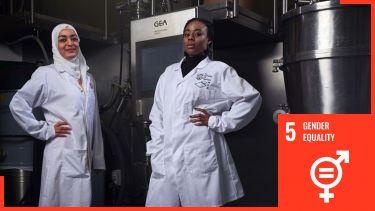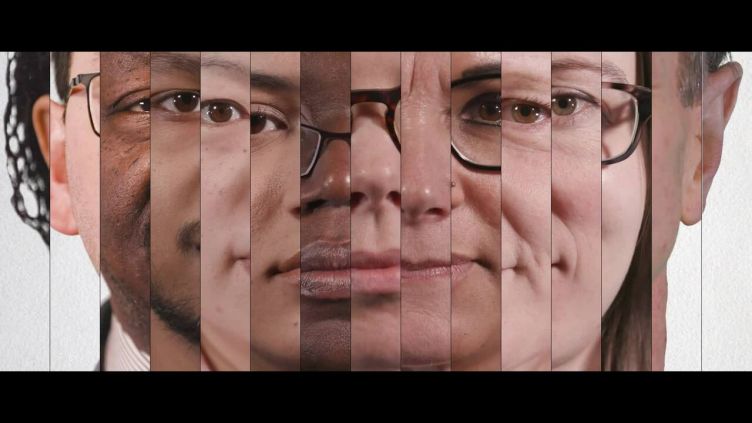SDG5: Gender Equality
Goal 5 focuses on reducing levels of violence against women and increasing the participation of women in education and positions of power. Through our teaching, global research and on-campus actions, we’re working to inspire, support and empower all genders locally and globally.

Key facts for how we are achieving SDG5
- Our Gender Pay Gap in 2021 is 8.4% down from 11.1% in 2017. We are targeting a further 5 percentage point reduction in our pay gap by 2025
- 7,550 female students starting a university degree in 2021 at Sheffield, equating to 54% of the intake
- 680 female students starting a degree at university who are first generation in their family to go to university in 2021
- Leadership: Our Senate and Council Committees have an overall average of 44% female membership. Six out of 13 colleagues on our Executive Board are female, including our Deputy Vice-Chancellor
- We are one of only 18 universities to hold a Silver institutional Athena SWAN award and one of only four institutions nationally to retain their Silver award upon renewal
- The Women@TUOS Staff Network is an aspirational and motivational space and support network for female staff from all backgrounds and at all stages of their careers
- We support women returning from maternity leave through our Women Academic Returners’ Programme (WARP)
Recognition within the University
-
Wall of Women
-
Engineering is a great choice for women, who are woefully underrepresented in this career path. We aim to break preconceived notions of what engineering is by showcasing our excellent Women in Engineering at The University of Sheffield. Multiple interviews have been carried out by students across all the engineering faculties the University has to offer. This is also related to the University’s Women in Engineering Student Society. Formed in 2012 and still running to this day, this society inspires the younger generation and raises awareness about engineering.
-
Athena SWAN
-
The Athena Swan Charter is a framework used within higher education and research, with the aim of encouraging and recognising commitment to advancing gender equality.
The Charter recognises our commitment to advancing women’s careers across the University and particularly in STEMM subjects: Science, Technology, Engineering, Mathematics and Medicine. We are one of only 18 universities to hold a Silver institutional Athena SWAN award and one of only four institutions nationally to retain their Silver award upon renewal.
- Peppy Health
-
We have invested in and retain a partnership with Peppy Health, an app that provides staff with tools to assist them in a variety of ways. One of these is specialist menopause support for staff members and their partners experiencing menopausal symptoms. The interactive course will provide colleagues with an understanding of what the menopause is, its affects and how to manage the menopause. This training builds on our work to raise awareness and understanding in the workplace.
- Gender equality in research
-
In 2020, we launched the White Rose Gender Equality College in collaboration with academic and professional colleagues from the University of Leeds and the University of York. A key driver of this work includes the recent change in requirement from Global Challenge Research Funders for research proposals to include a gender equality statement, in order to provide equal opportunities for male and female researchers.
The University
- Gender pay gap
-
Our vision for the University includes a commitment to ‘identify and tackle patterns of inequality, to ensure that staff and students can achieve their full potential’ in order to eliminate our Gender Pay Gap. We are embarking on a programme of work to deliver a target for Gender Pay Gap reduction of five percentage points by 2025. The Gender Pay Gap report can be found at the top of the webpage.
- Support for Carers
-
We are a member of Employers for Carers and are committed to ensuring employers have the support to retain and manage employees with caring responsibilities. We continue to look for ways in which we can support those staff with caring responsibilities who are predominantly women.
- Support for parents
-
Parents@TUOS is a network for all staff and students who have families or are thinking about having families, offering a range of support to all staff and students through career breaks and sharing best practice and tips.
- Governance
-
Our Gender Equality Committee is a formal sub-committee of the University Council Equality, Diversity and Inclusion Committee. It supports the achievement of the University’s key performance indicators and equality objectives, by raising awareness of gender equality and acting as a body of expertise on gender issues; and advises the Equality, Diversity and Inclusion Committee, Human Resources and senior management on measures to address gender equality.
Gender Equality at the University and across departments
This SDG encompasses the equality of all genders such as male, females, non-binary, transgender, gender neutral, agender, pangender, genderqueer, two-spirit, and third gender.
The Department of Philosophy published their Gender Identity Policy outlining zero tolerance of discrimination or bullying towards any gender.
Global research
Tackling gender inequality in Latin America
Research at the University of Sheffield is at the forefront of promoting gender equality in Latin American schools by celebrating women who helped shape the region. The Great Latin American Women project is one of the initiatives that the University of Sheffield is undertaking with project partner, Billiken, a children's magazine in Argentina. As Billikien approached its centenary, it was decided to create a book to commemorate one hundred Great Latin American Women. The book presents a diverse range of women who have shaped Latin American history and society through contributions to fields such as human rights, conservation, the Arts, technology and sport.
Read more about tackling gender inequality in Latin America
Empowering women through radio
Women in Niger are victims of widespread gender inequality, but radio can provide a platform for female empowerment. In Niger, radio programmes are the primary source of information for both men and women. However, it’s common for husbands not to allow their wives to attend these listening sessions, so the women miss out. In collaboration with Foundation Hirondelle, research by the University of Sheffield is already encouraging women to establish female-only listening groups, meaning they have access to vital information. Armed with new information about their legal rights, family planning and healthcare these women are equipped to resist marginalisation. They are being given their voice back.

